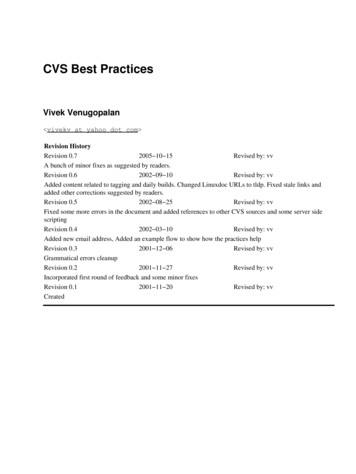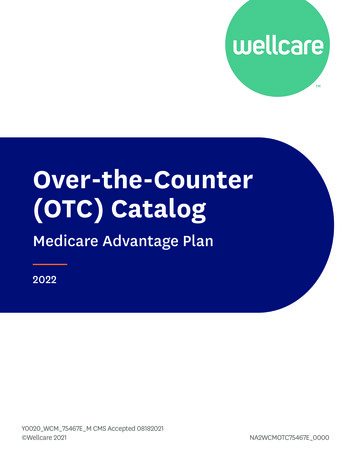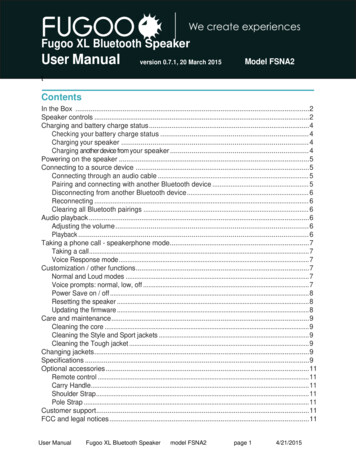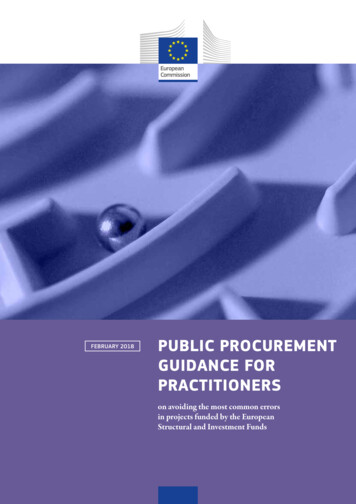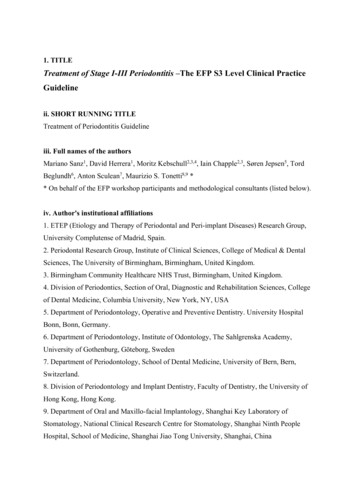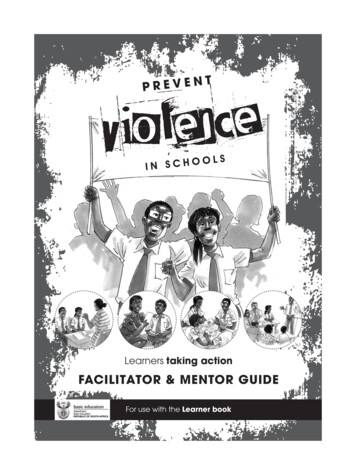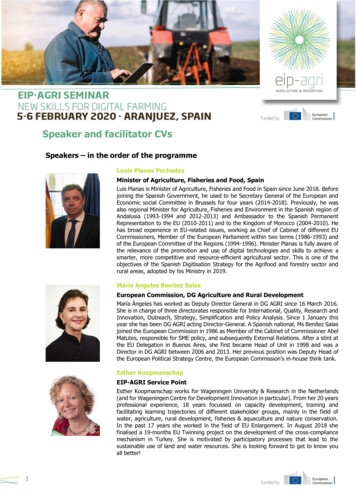
Transcription
CV INFORMATIONEIP-AGRI WORKSHOP ‘OPERATIONAL GROUPS: FIRST EXPERIENCES’LEGNARO, ITALYSpeaker and facilitator CVsSpeakers – in the order of the programmeLouis Planas PuchadesMinister of Agriculture, Fisheries and Food, SpainLuis Planas is Minister of Agriculture, Fisheries and Food in Spain since June 2018. Beforejoining the Spanish Government, he used to be Secretary General of the European andEconomic social Committee in Brussels for four years (2014-2018). Previously, he wasalso regional Minister for Agriculture, Fisheries and Environment in the Spanish region ofAndalusia (1993-1994 and 2012-2013) and Ambassador to the Spanish PermanentRepresentation to the EU (2010-2011) and to the Kingdom of Morocco (2004-2010). Hehas broad experience in EU-related issues, working as Chief of Cabinet of different EUCommissioners, Member of the European Parliament within two terms (1986-1993) andof the European Committee of the Regions (1994-1996). Minister Planas is fully aware ofthe relevance of the promotion and use of digital technologies and skills to achieve asmarter, more competitive and resource-efficient agricultural sector. This is one of theobjectives of the Spanish Digitisation Strategy for the Agrifood and forestry sector andrural areas, adopted by his Ministry in 2019.María Ángeles Benítez SalasEuropean Commission, DG Agriculture and Rural DevelopmentMaría Ángeles has worked as Deputy Director General in DG AGRI since 16 March 2016.She is in charge of three directorates responsible for International, Quality, Research andInnovation, Outreach, Strategy, Simplification and Policy Analysis. Since 1 January thisyear she has been DG AGRI acting Director-General. A Spanish national, Ms Benítez Salasjoined the European Commission in 1986 as Member of the Cabinet of Commissioner AbelMatutes, responsible for SME policy, and subsequently External Relations. After a stint atthe EU Delegation in Buenos Aires, she first became Head of Unit in 1998 and was aDirector in DG AGRI between 2006 and 2013. Her previous position was Deputy Head ofthe European Political Strategy Centre, the European Commission's in-house think tank.Esther KoopmanschapEIP-AGRI Service PointEsther Koopmanschap works for Wageningen University & Research in the Netherlands(and for Wageningen Centre for Development Innovation in particular). From her 20 yearsprofessional experience, 18 years focussed on capacity development, training andfacilitating learning trajectories of different stakeholder groups, mainly in the field ofwater, agriculture, rural development, fisheries & aquaculture and nature conservation.In the past 17 years she worked in the field of EU Enlargement. In August 2018 shefinalised a 19-months EU Twinning project on the development of the cross-compliancemechanism in Turkey. She is motivated by participatory processes that lead to thesustainable use of land and water resources. She is looking forward to get to know youall better!1
SPEAKER AND FACILITATOR BIOS – EIP-AGRI SEMINAR ‘NEW SKILLS FOR DIGITAL FARMING’5-6 FEBRUARY – ARANJUEZ, SPAINEmily GrayOrganisation for Economic Co-operation and Development (OECD)Emily Gray is an agricultural policy analyst and the thematic lead for Innovation andDigital Agriculture in the OECD’s Trade and Agriculture Directorate. Since joining theOECD in 2015, Emily has worked on a range of issues including projects on risk andresilience in agriculture, innovation systems in food and agriculture, and reviews ofpolicies to improve agricultural productivity and sustainability in OECD countries andSoutheast Asia. Prior to joining the OECD, Emily was at the Australian Bureau ofAgricultural and Resource Economics and Sciences (ABARES) where she carried outeconomic analysis and policy research on agricultural productivity and biosecurity policy.Emily has a PhD in Agricultural and Resource Economics from the University of Sydney.Ethan ClearyIrish Farmers AssociationAg Tech Policy & Innovation ExecutiveEthan comes from a 5th generation arable farm and is passionate about connectingagriculture with technology that benefits and supports the farmer.He has worked as a developer, designer, product manager, technology consultant andstrategist for over 15 years, across a range of industries, from large multinationals andthe public sector to early stage start-ups. He is currently the Irish Farmers’ Association’sTechnology and Innovation Executive responsible for the Association’s overalltechnological development and strategic roadmap. From a policy perspective, his currentfocus is driving the innovation and digital agenda for Irish farmers at an EU and nationallevel with the aim of ensuring farmers benefit from this era of rapid digitaltransformation. He is also a technology expert on Copa-Cogeca’s agricultural technologyworkforce and is currently part of the DEMETER Horizon 2020 project which is a largescale deployment of farmer-centric, interoperable smart farming-IoT (Internet of Things)based platforms, delivered through a series of 20 pilots across 18 countries.Fabio CossuEuropean Commission, DG Agriculture and Rural DevelopmentFabio Cossu works as policy officer at the European Commission, DG AGRI in the‘Research and Innovation’ unit where he contributes to the implementation of theEuropean Innovation Partnership for Agriculture productivity and sustainability (EIPAGRI), holding responsibility for communication activities of the EIP-AGRI Network.Agronomist by academic background, he has been working in the field of ruraldevelopment for over ten years, both as policy analyst and independent evaluator of EUrural development programmes, with a focus on investments in the agri-food sector.Lotte IpsenBygholm Agricultural College, DenmarkAs Head of Education at Bygholm Agricultural College Lotte Ipsen is in charge of 20-25teachers and the educational program for skilled farmers and farm managers. BygholmAgricultural College is a self-governing institution under the Ministry of Education IDenmark. She has 25 years’ experience in teaching, leadership of teachers anddeveloping educational programs to keep up with new trends and technologies in bothfarming and teaching farming. She is the author of the textbook “Plant production”, whichis the main textbook used in the skilled farmer’s education in Denmark on subjectsconcerning plant production. She has an academic background (degree in AgriculturalScience, 1995) and a master degree in learning processes and educational leadershipfrom 2018.2
SPEAKER AND FACILITATOR BIOS – EIP-AGRI SEMINAR ‘NEW SKILLS FOR DIGITAL FARMING’5-6 FEBRUARY – ARANJUEZ, SPAINMiguel CorderoUniversity of Santiago de Compostela, SpainErasmus SFATE: Smart farming training for employmentForestry Engineer, has participated in various projects of R & D innovation in the fieldof Geographic Information Systems (GIS) applied to land management, ruraldevelopment and management of natural resources at local, regional and internationallevel.Since 2004, he is the technical manager for USC's Territorial Information System (SIT)technology platform. He specializes in GIS, 3D capture and modeling of remote sensingdata; terrestrial laser scanner, drones (with optical sensors and lidar) and groundpenetrating radar. Works part-time on his PhD thesis about lidar and its application toforest management. In the training area of SIT, he organizes and gives courses in GISand remote sensing. He participates in the Master on Sustainable Land Planning, lecturingin courses dealing with Geomatics and Techniques to Capture of Spatial Information. Hehas experience in the community management of communal forests, having beenpresident and secretary of two of them, oriented to the production of wood, in the centralplateau of Galicia. Recently worked on initiatives related to the transfer of innovation inagriculture and forest at European level such as SFATE (Erasmus K2) and AgridemoF2F (H2020).Tetiana PavlenkoUniversity of Hohenheim, GermanyEducating for Technology Take-off (EIT Food)M.Sc. Tetiana Pavlenko has done her diploma in Commodity Science and InternationalTrade at Kyiv National University of Trade and Economics (Ukraine). She was working asan office manager/project assistant in the IT company. In 2017, she has completed amaster's study in Organic Agriculture and Food Systems at the University of Hohenheim(Germany). During her studies, she took part in several projects, including digitaltechnologies. Ms. Pavlenko was working as an intern on an organic farm, where shereceived knowledge in production and quality management of vegetables. In 2018, shejoined the University of Hohenheim as a research associate. She is involved in a varietyof projects (EIT Food, Horizon 2020, ICT AGRI Era Net) working with precisionagriculture, sustainable practices, food systems, bioplastics, and innovative packagingtechnologies.Hubert GerhardyEIP-AGRI Operational Group Pig Health Lern-Netzwerk, GermanyHubert Gerhardy is a Market Researcher, Consultant, and Part Time Professor inagricultural sciences. Regarding to farm specific challenges he designed and coordinatedinnovation approaches to develop farm specific measurements in multi actor approaches.Based on his extensive experiences, interdisciplinary projects were initiated like“Development of a learning network to enhance the willingness to improve continuouslyhealth management in pig production”, “Multivariate assessment of animal welfare onfarm level”, “Approaches to reduce the use of antibiotics”, and “Assessments ofBiosecurity on pig farms and of organs at abattoirs”. To support digitising precisionlivestock breeding SmartPigProduction (EIP Agri) and SmartPigHealth (a part ofSmartAgriHubs, Horizon 2020) were launched.3
SPEAKER AND FACILITATOR BIOS – EIP-AGRI SEMINAR ‘NEW SKILLS FOR DIGITAL FARMING’5-6 FEBRUARY – ARANJUEZ, SPAINJürgen VangeyteLiving Lab – ILVO, FlandersDr. ir. Jürgen Vangeyte (M), is scientific director at ILVO, ILVO performs multidisciplinary,innovative and independent research aimed at economically, ecologically and sociallysustainable agriculture and fisheries in a from farm to fork approach.He is the head of the department Agrifood Technology. The group exists of more than35 researchers supported by a technical staff. He organizes, coordinates, and managesthe research and the technical activities to support the implementation of the researchand innovation. He has a PhD in Bioscience Engineering at the Catholic University ofLeuven, on the topic ’Development and validation of a low-cost technique to predictspread patterns of centrifugal fertiliser spreaders’. He coordinates national researchprojects and is work package leader in several large European projects, like IOF2020,Smart Agri Hubs and Cybele. Jürgen Vangeyte was an expert in the EIP-AGRI FocusGroup ‘Mainstreaming precision agriculture’. He is also a contributor to the " SmartFarming and Food Safety Internet of Things Applications – Challenges for Large ScaleImplementations" report for AIOTI WG06 – Smart Farming and Food Safety. Hisdepartment supports an active and mature Digital Innovation Hub, called Smart DigitalFarming and an Enoll recognized Living Lab on Agrifood technology. Also the Flemishdata sharing initiative DjustConnect is also developed and implemented by the samedepartment.George BeersWageningen University and Research, the NetherlandsHorizon 2020 SmartAgriHubsDr. George Beers is a Horticultural Engineer. He holds a PhD in Management Science witha thesis on project management. He is a specialist in strategic information managementin agribusiness. His core competence is connecting different worlds. Dr. Beers works forWageningen since 1991 in several research and management positions. He was ScientificDirector of the co-innovation program Agri Chain Competences (1998-2001), founder andCEO of the Green Knowledge Cooperation on innovation of the Dutch agriculturaleducation system (2004-2010). Between 1999 and 2004 Dr. Beers held the Chair ICT inAgribusiness at Wageningen University. From 2011-2014 he resided in the Kingdom ofSaudi Arabia initiating and implementing the Saudi Agricultural Information Centre.Currently he is coordinating large scale EU projects on the field of Future Internet inAgriFood. Since January 2017 he is coordinator of the H2020 Large Scale Pilot on Internetof Farm & Food (IoF2020) and a project on Digital Innovation Hubs for farmers(SmartAgriHubs).Tom KellyTeagasc, IrelandHorizon 2020 FAIRShareProf. Tom Kelly. M.Agr.Sc., Ph.D., MBA, Teagasc, IrelandTom Kelly is Director of Knowledge Transfer in Teagasc since 2010; He is an AgriculturalScience graduate, with both Masters and Ph.D awarded by University College Dublin. Hecompleted an MBA through University of Limerick in 1998. Tom has worked in range ofroles in advisory and education. He currently leads the agricultural education and farmadvisory services in Teagasc. He is a founding board member and former chairman ofEUFRAS (European Forum for Agricultural and Rural Advisory Services) 2013 -2019. Hewas appointed Adjunct Associate Professor of Agricultural. Extension at University CollegeDublin in 2017. In 2019 he was appointed an International Fellow of the Royal SwedishAcademy for Agriculture and Forestry. Participant in EU-EIP Assembly and innovationsubgroup, EU research projects (Agrispin, LIAISON, FAIRshare and i2connect).4
SPEAKER AND FACILITATOR BIOS – EIP-AGRI SEMINAR ‘NEW SKILLS FOR DIGITAL FARMING’5-6 FEBRUARY – ARANJUEZ, SPAINThomas EngelJohn Deere, GermanyDr. Thomas Engel studied Agricultural Sciences at the Technical University MünchenWeihenstephan. After his graduation he stayed there as assistant professor and didresearch around the use of electronics and software in agriculture with focus on precisionagriculture.He then introduced the first precision farming products in the German market as ProductManager Precision Farming for Claas. In 2000, he joined John Deere, where he startedas Engineering Manager for Agricultural Management Solutions. After that he led theIntelligent Solutions Group and did strongly grow the precision farming business inEurope. Since 2015 he is Manager Technology Innovation Strategy at the EuropeanTechnology Innovation Center and is responsible to work with Universities and partnercompanies to develop new innovative solutions and services.Beatrice DingliVIVEA – Blended digital trainingI joined VIVEA, the Training Insurance Fund for agricultural business managers in 2001.Graduated with a master’s in business Conduct and Strategic Management, I am VIVEAGeneral Manager since 2012.I work with 650 elected officials mandated by professional agricultural organisations intheir strategic reflections on training policies for agricultural business managers. With my72 collaborators, I encourage the development of training projects, and studiespromoting innovation in order to allow agricultural business managers to respond tosocietal, economic and environmental challenges. Understanding and proposing todevelop talents and perpetuate businesses are my daily driving forces.Gintare KucinskieneEIP-AGRI Operational Group 'Gate of innovations'Gintare Kucinskienė started as a veterinary surgeon in 1998. Later she was responsiblefor beef sector development as an adviser in the Chamber of Agriculture of Lithuania.Starting from 2007 G. Kucinskiene worked under the National Rural DevelopmentProgramme 2004-2013 in the Ministry of Agriculture of the Republic of Lithuania and wasbusy with best practice projects dissemination. From 2013 G. Kucinskiene started to workas an innovation development specialist in the Lithuanian Agricultural Advisory Service.For more than six years she has been leading the activities of international andinnovations projects, and international and national cooperation between differentorganisations.Hercules PanoutsopoulosAgricultural University of Athens, GreeceHorizon 2020 EURAKNOS & EUREKAJudith Hercules Panoutsopoulos is a Research Associate at the Department of NaturalResources Management and Agricultural Engineering of the Agricultural University ofAthens. His work revolves around NoSQL storage systems design and development, aswell as Natural Language Processing. Projects he is currently involved in are EURAKNOS(https://www.euraknos.eu), EUREKA and SHERPA (http://www.rural-interfaces.eu).Hercules holds a BSc degree in Mathematics from the Department of Mathematics of theNational and Kapodistrian University of Athens and an MSc degree in e-Learning from theDepartment of Digital Systems of the University of Piraeus. His interests revolve aroundNatural Language Processing, Social Network Analytics and Recommendation Systems.Hercules has been involved both as lead and co-author in a number of conference papers,book chapters and a journal paper.5
SPEAKER AND FACILITATOR BIOS – EIP-AGRI SEMINAR ‘NEW SKILLS FOR DIGITAL FARMING’5-6 FEBRUARY – ARANJUEZ, SPAINKerstin RosenowEuropean Commission, DG Agriculture and Rural DevelopmentKerstin is Head of Unit ‘Research & Innovation’ in DG AGRI, European Commission whereshe is responsible for programming, managing and monitoring agricultural research andthe European Partnership for Agricultural Productivity and Sustainability (EIP-AGRI).Previously she was Head of Unit in the EC Research Executive Agency (REA) managingthe implementation of the project portfolio for Horizon 2020 Societal Challenge 2 (foodsecurity, sustainable agriculture and forestry, marine, maritime, and inland waterresearch and the bioeconomy). She's been working in the EC for over 15 years aftercovering a managerial position in the German administration (Representation of the Stateof Hessen to the EU). For DG AGRI she coordinated negotiations with pre-accession andcandidate countries and the preparation of the 2014-2020 CAP legislative framework.Poster presenters (seminar day 1) – in alphabetical orderKnud Bay SmidtDenmarkKnud has been a self-employed farmer since 1987. He has an arable farm (cereal,grass seed, oilseed, legumes and grass for hay) and applies no-till / conservationagriculture. Trading with used agricultural implement; export to Asia, Africa and withinEurope. He is a member of the Global Farmer Network, a worldwide network offarmers, working for more free trade, open access to knowledge, gene technology andmodern technology in general, with the target of improving the prosperity in the ruralarea, particularly in less developed nations. He is interested in culture, history andpolicy. Studies: agricultural college, complemented with economics- and managementcourse. Speaks English, some German and a bit of French.www.globalfarmernetwork.orgTwitter: @BayKbs LinkedIn: knud-bay-smidtBoris BrestnichkiBulgariaBoris Brestnichki works as an agronomist in Geosemselect Ltd – a Bulgaria-basedbreeding and seed production company. He has worked on projects dealing withhydroponic growing of breeding material and hydroponic seed production. As part ofthe company he’s had experience mainly with vegetable varieties for greenhousegrowing. He’s part of the company’s team dealing with digitalising and standardisingthe collection and manipulation of data.6
SPEAKER AND FACILITATOR BIOS – EIP-AGRI SEMINAR ‘NEW SKILLS FOR DIGITAL FARMING’5-6 FEBRUARY – ARANJUEZ, SPAINMiguel CachãoPortugalMiguel graduated as animal science engineer but since 2011 he only works withvineyards. Since 2017 he has a winery and makes wine from his 10 ha and from othergrapes that he buys from his neighbours. Besides this, he also works on a grapevinegrowers association. In both situations, he tries to use technologys using Sentinel-2images to create NDVI maps, remote traps for pests, soil mapping with electricconductivity, fluorescence sensors to detect nutritional needs besides other equipmentthat is challenging to test. He is doing a post-graduate course on enology in order tomake better wine.Saverio DelsanteItalyI am the manager of my family dairy farm. I am 34 and I’m in the sixth generation offarmers. I run the farm still with my father. I studied Architecture at the University ofParma and I hold a Master’s degree in Agribusiness and Food Management. My farmis located in Parma, we cultivate 120 ha with forages and cereals and we milk 140dairy cows. The milk is collected in a small dairy plant called Caseificio San Pier Damianiproducers of Parmigiano Reggiano cheese. I’m married and I have a baby. Outside ofwork I enjoy playing football with friends and travelling with my family.Vincenza FerraraItalyI am a small-scale olive farmer and extra virgin olive oil producer in central Sicily (Italy).I manage my olive orchards (made of both old century olive trees and relativelyyounger plants) according to the principles of organic agriculture and agroecology. Myfarm has been realised thanks to a project cofunded by the EU Agricultural Fund forRural Development. It is 100% sustainable from an environmental point of view sincewe recycle all the leftovers from the olive oil production as biomass and fertiliser, andall the farm facilities are powered by renewable energy produced at the farm with ourown solar panels.I am also an historical ecologist and my main research interests are related to theinvestigation of olive agrosystems long term dynamics, with a focus on olives asbiocultural refugia.Laura GirdžiūtėLithuaniaDr. Assoc. Professor at Vytautas Magnus UniversityChief accountant at the Public Institution Practical training and trial center of theLithuanian University of Health SciencesDr. assoc. prof. Laura Girdziute works in Vytautas Magnus university AgricultureAcademy since 2009. Research area is integrated risk assessment and management inagriculture. From 2017 she is working as group leader in COST action CA16123 “SafetyCulture and Risk Management in Agriculture” where the main research focus is onidentifying effective measures for training and integrating vulnerable populations(including refugees) into the agricultural workforce. From 2017 she is working in PublicInstitution Practical training and trial center of Lithuanian University of Health Sciencesas chief accountant, which gives her the opportunity to understand agricultural sectorspecifics and problems not only from a scientific but also from a practical point of view.7
SPEAKER AND FACILITATOR BIOS – EIP-AGRI SEMINAR ‘NEW SKILLS FOR DIGITAL FARMING’5-6 FEBRUARY – ARANJUEZ, SPAINGeminas KontrimavičiusLithuaniaCrop FarmerThirty years ago, my family started farming with 3 hectares of land. In the beginningit was a livestock farm, now our farm grows more than 600 hectares of crops likewheat, rapeseeds, barley, protein crops. I worked in the farm since childhood, butofficially became a farmer in 2008 at the age of eighteen. Since 2009, I studied financialeconomics and in 2013 I got a Bachelor’s degree in Economics. That same year I wasa trainee at the Rural Development Department of the Ministry of Agriculture of theRepublic of Lithuania. Later, I decided to study financial markets for a Master’s degreein Economics (in 2016); all my studies were in Mykolas Romeris University. I am alsoa Member of the Lithuania Farmers Union since 2010 and a member of the board ofLithuania’s Grain Growers Association since 2017. I am a co-founder and a chairmanof the board of Cooperative “Jukagros” since 2019. This cooperative was establishedat the initiative of regional farmers.Maja KósaSerbiaMaja Kósa is a young pig farmer from Vojvodina from Serbia. Since 2019, she has afarm with 31 sows and almost 300 piglets. Beside her agricultural activities, she is aPh.D. student at the Doctoral School of Educational Sciences at the University ofSzeged in Hungary. As a young researcher, she is extremely interested in digitalisation,first of all from an educational point of view. She would like to acquire the necessaryknowledge and skills to use modern technologies in feeding.Aušrius KučinskasLithuaniaAusrius was an expert on the Common Agricultural Policy for the Ministry ofAgriculture (Republic of Lithuania) from 2012 tot 2017. Since 2017, he is adviserto the Methodology and Coordination Unit of the Agricultural Support Department,at the National Paying Agency under the Ministry of Agriculture in Vilnius(Lithuania). He has a Bachelor in Agricultural economics from AleksandrasStulginskis University, Lithuania. Since the beginning of 2019, he is responsible foron-the-spot checks and remote sensing of Direct Support measures, includingimplementation of Sentinel satellite data for checks and development of the NMAAgro application.Thomas LagkasGreeceCo-owner at the OLYMPUS CONSULTING company stated in Greece, which provideshigh quality services of sustainable forest management in public and private forestowners.8
SPEAKER AND FACILITATOR BIOS – EIP-AGRI SEMINAR ‘NEW SKILLS FOR DIGITAL FARMING’5-6 FEBRUARY – ARANJUEZ, SPAINJuan OlivaresSpainJuan is an oleologist and agricultural engineer. He’s working as an oliviculture andoleology consultant (from ‘farm to fork’ philosophy), focusing on olive orchardmanagement (implementation of IPM techniques, fertilisation and irrigation plans,harvesting planning, design of new olive orchards, precision agriculture), high qualityolive oil production (plan, determination harvest time, quality management,professional olive oil taster). As an oleologist of an high-quality olive oil mill, he hasdeveloped a luxury brand of an extra virgin olive oil, from concept to launch, and hasimplemented brand strategies to increase awareness among clients. He is the managerof 280 ha of olive and almond orchards, and works on the design of olive mills.LinkedIn: Juan-Olivares-FernándezYolène PagèsFranceYolène Pagès, recently elected as chairman of Nuffield France, is interested inagroecology and the role that different farming systems can play in enhancing ruralareas. And how these farming systems can become more sustainable, taking in accountenvironmental, social and financial issues.Yolène is a graduate of Purpan University in Toulouse and worked for many years asan agronomist for a technical institute in the South of France. She has facilitated anumber of multi-actor projects involving groups of innovative farmers, researchers,technicians and localy elected representatives. These projects have mainly been in theNational Parks of Grand Causses and Aubrac. She has also been involved in her familyfarm for many years where they produce for the Roquefort cheese (PDO), made withsheep milk. Yolène has traveled extensively in such places as Africa and America.Yolène is now developing a project with a group of farmers seeking to add value tosheep milk, including “terroir” values.Agnès PaponeFranceAgnès and Renaud Papone have been new entrant organic family farmers in thesouthern French Alps since 2010. They brought a long-abandoned subsistence familyfarm back to life and into production as a radical lifestyle change, from vastly differentbackgrounds. One of their first initiatives, at the behest of their consumers, was tocreate a local farmers’ cooperative with other nearby organic farms and grow it intothe present-day collective of nearly 50 farms and a handful of local artisans calledMontagnes Paysannes. They built local consumer-supported agriculture networks andbecame tutors for other peers converting to farming from other careers. Curious bynature and technophiles, they started their farm without formal farming training andacquired their expertise from peers, YouTube, books, and are largely self-taught. Theirapproach to incubating other new entrants and sharing experiences as an open farmhas helped launch many of their close collaborators into organic farming. Their uniqueperspective coming from diverse non-farming careers, their passion for working incollaboration with other farms to leverage farmers' reach and voices, have made for afascinating, fulfilling and humbling experience.Prior to becoming new entrant farmers, Agnès was an HIV researcher in SouthernAfrica and completed her studies in International Public Health in Sydney, Australia.Renaud managed local supermarkets in the Southern French Alps where he alsopursued his passion for rock climbing and back-country skiing.www.lavancia.com9
SPEAKER AND FACILITATOR BIOS – EIP-AGRI SEMINAR ‘NEW SKILLS FOR DIGITAL FARMING’5-6 FEBRUARY – ARANJUEZ, SPAINJolanda RaaijmakersThe NetherlandsCo-owner of Raaijmakers Arable Farming & Crop ProtectionBoard member of: Zuidelijke Land en Tuinbouw Organisatie (Farmers Union), RegionalDevelopment Board, Local Community Association; HospiceJoland Raaijmakers Started her career in care (Intensive Care Nurse Diploma) and stillworks part time in domestic care. Together with her husband she owns an arable farmwith crop protection contractor work, where she does the planning/management andadministration. In their farm they started a centre for vocational education for farmingand contractors work (machinery, soil & crop management) and for primary schools(introduction to agriculture); in cooperation with formal education (Helicon and localprimary schools). She enhances innovations in many projects, f.i. on datamanagement, new crops (soya in NL), education (Klasseboeren, etc).Peter PareeThe NetherlandsProgram Leader / Zuidelijke Land en Tuinbouw OrganisatieMember Working Party Research and Innovation, Copa-Cogeca / Member EUFRASPeter Paree (1956, Wageningen University) is program leader / project developer inagriculture, rural development and crossovers agri high tech. He has worked for 37years in strategic advice, project- and programme management.He links management strategies of farmers to their environment, in projects that fosterthe goals of farmers, clients, neighbours and society. He supports and combines theentrepreneurial efforts of stakeholders in innovations: relevant advisory services,scientists, ICT, mechanisation and farmers in regional, national and EU projects. He isinvolved in a number of projects enhancing use of farm data and ICT, like theFAIRshare p
Prof. Tom Kelly. M.Agr.Sc., Ph.D., MBA, Teagasc, Ireland Tom Kelly is Director of Knowledge Transfer in Teagasc since 2010; He is an Agricultural Science graduate, with both Masters and Ph.D awarded by University College Dublin. He completed an MBA through University of Limerick in 1998. Tom has worked in range of roles in advisory and education.
